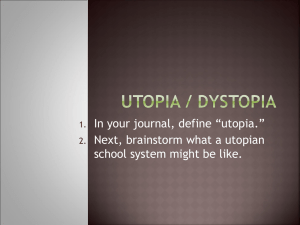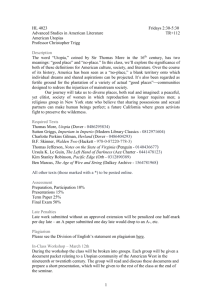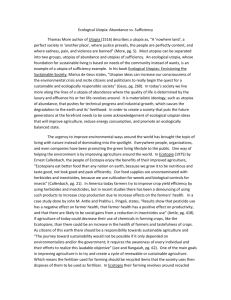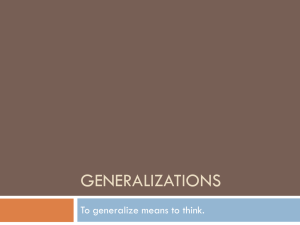DEMOCRACY AS AN OPEN
advertisement
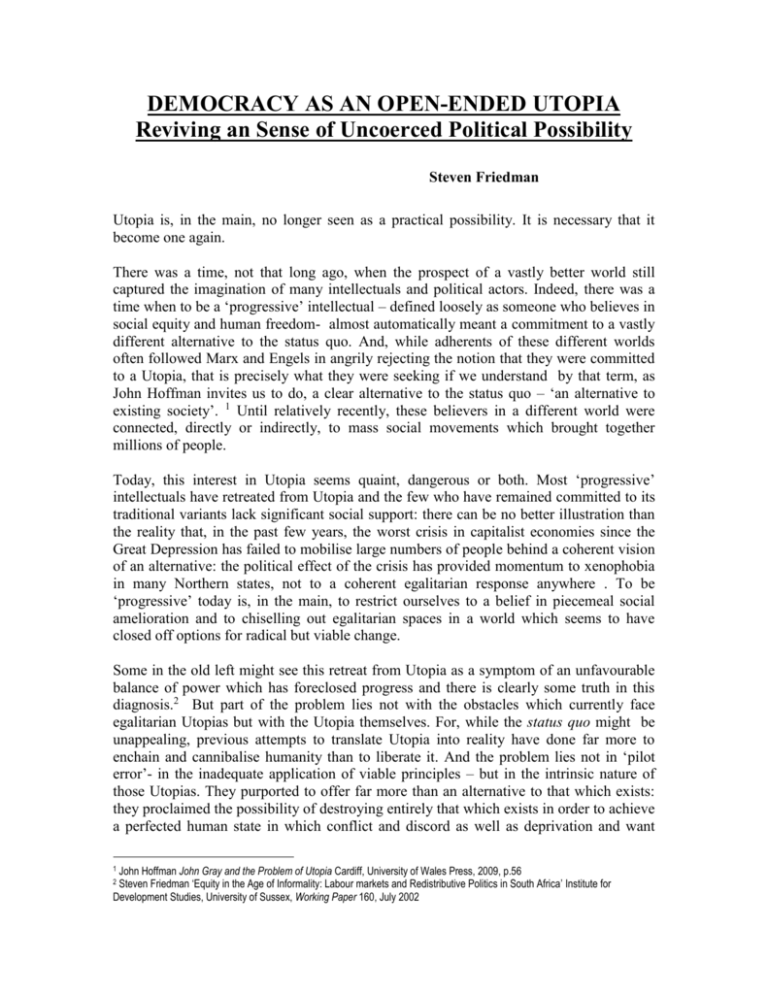
DEMOCRACY AS AN OPEN-ENDED UTOPIA Reviving an Sense of Uncoerced Political Possibility Steven Friedman Utopia is, in the main, no longer seen as a practical possibility. It is necessary that it become one again. There was a time, not that long ago, when the prospect of a vastly better world still captured the imagination of many intellectuals and political actors. Indeed, there was a time when to be a ‘progressive’ intellectual – defined loosely as someone who believes in social equity and human freedom- almost automatically meant a commitment to a vastly different alternative to the status quo. And, while adherents of these different worlds often followed Marx and Engels in angrily rejecting the notion that they were committed to a Utopia, that is precisely what they were seeking if we understand by that term, as John Hoffman invites us to do, a clear alternative to the status quo – ‘an alternative to existing society’. 1 Until relatively recently, these believers in a different world were connected, directly or indirectly, to mass social movements which brought together millions of people. Today, this interest in Utopia seems quaint, dangerous or both. Most ‘progressive’ intellectuals have retreated from Utopia and the few who have remained committed to its traditional variants lack significant social support: there can be no better illustration than the reality that, in the past few years, the worst crisis in capitalist economies since the Great Depression has failed to mobilise large numbers of people behind a coherent vision of an alternative: the political effect of the crisis has provided momentum to xenophobia in many Northern states, not to a coherent egalitarian response anywhere . To be ‘progressive’ today is, in the main, to restrict ourselves to a belief in piecemeal social amelioration and to chiselling out egalitarian spaces in a world which seems to have closed off options for radical but viable change. Some in the old left might see this retreat from Utopia as a symptom of an unfavourable balance of power which has foreclosed progress and there is clearly some truth in this diagnosis.2 But part of the problem lies not with the obstacles which currently face egalitarian Utopias but with the Utopia themselves. For, while the status quo might be unappealing, previous attempts to translate Utopia into reality have done far more to enchain and cannibalise humanity than to liberate it. And the problem lies not in ‘pilot error’- in the inadequate application of viable principles – but in the intrinsic nature of those Utopias. They purported to offer far more than an alternative to that which exists: they proclaimed the possibility of destroying entirely that which exists in order to achieve a perfected human state in which conflict and discord as well as deprivation and want John Hoffman John Gray and the Problem of Utopia Cardiff, University of Wales Press, 2009, p.56 Steven Friedman ‘Equity in the Age of Informality: Labour markets and Redistributive Politics in South Africa’ Institute for Development Studies, University of Sussex, Working Paper 160, July 2002 1 2 would be abolished. It may have been this ambition which attracted the loyalty of academics and academics – and prompted many to give their lives in the quest for it. But it is also this which destroyed the credibility of Utopian projects. None achieved anything close to that which they promised: more importantly, precisely because they envisaged a perfect, static, state, they became vehicles for assaults on freedom and on human lives. Just about anything can be justified if the goal is the perfect society and just about anything was: revolutionary elites, emboldened by the claim that they were achieving the fulfilment of human history, imposed themselves on society and extracted a terrible price in exchange for a quest for an unattainable dream (with them, of course, as the sole guides). They did so almost invariably by violence – both that used to seize state power and that used to maintain it. This too was inevitable because perfection surely cannot be achieved within an imperfect status quo and so what existed needed to be smashed, not changed – and because the taking of human life is presumably justified if the purpose is the salvation of all humanity. The tragedy was surely an inevitable consequence of the promise, for the social closure which ‘traditional’ egalitarian Utopias offered lent itself to inevitable disappointment and disaster. These Utopias were closed, in the sense that they posited an end point at which conflict and contention would end. So too, by implication, would politics, understood as the rule-bound clash of interests and ideas – it is no accident that Lenin’s vision of the good society was one in which, in effect, politics was collapsed into administration and so abolished.3 It followed that, on attaining power, the Utopians would abolish politics in practice as well as thought by installing themselves as the sole arbiters of salvation’s requirements. Ideas which promise complete and perpetual social redemption become powerful weapons of oppression because they enable those who hold power to insist that dissenters are not merely people who hold a different opinion but obstacles in the way of achieving human perfection: indeed, the promise of the perfect society is one of the most potent authoritarian inventions ever for it promises, in exchange for obedience, nothing short of the end of all the social evils which have afflicted humanity. It matters little whether those who invoke these ideas are sincere believers in the classless society or power-mongers using these ideas to entrench their authority: the effect of these Utopias is inevitably to deny freedom in the name of perpetually entrenching it. This antipathy to politics and the inevitable uncertainty it brings also helps to explain why many of the Utopias have often been less than effective in ensuring development and prosperity. Part of the ‘closedness’of traditional Utopias was their assumption that perfection could be commanded or imposed on society. Thus, once the political standardbearers of the traditional Utopias gained state power, they assumed that they could use it to impose a development path on society. After all, if Utopia meant a fixed, defined, end point one of whose features was the end of strife or contention, a Utopian development path could not emerge by allowing multiple centres of economic power any more than it could be tolerant of multiple centres of political power. If it required the destruction of existing social and economic power structures, it precluded any possibility of negotiating change with them. And so the command economy became the vehicle of the promised 3 AJ Polan Lenin and the End of Politics, Methuen, London, 1984 perfection at the cost of snuffing out the energy and enterprise which is crucial to both development and growth – and, of course, at the cost also of denying the agency of the poor and dispossessed. That said, Utopia’s current troubles are a serious setback to attempts to build societies which expand human freedom, particularly the liberty of the many varieties of powerless and propertyless people whose voicelessness is illustrated, among many other signs, by the current tendency in development discussion to lump together a range of human groups and experiences in the blanket label ‘the poor’. It is trite to point out that we live in a world marked by deep inequalities of power and privilege. It is also one in which liberal democracy, in its social democratic variants probably the nearest humans have come to achieving a viable framework for offering everyone a greater say in the decisions which shape their lives, is in trouble everywhere. In the new democracies of the South, it struggles to establish itself in content rather than form, in the established democracies of the North, low voter turnout4 and surveys showing deep dissatisfaction5 indicate that citizens do not believe that they control their government as democratic theory insists they should; this implies that formal democracy may have become in practice rather than theory a new form of oligarchy. The flight from Utopia, then, threatens to shrink our political and social horizons, leaving vast inequalities in access to power and voice as well as wealth unchallenged. If to be Utopian means, as Hoffman suggests, to insist that an alternative is both desirable and feasible – that, to coin a now-tired phrase, another world is indeed possible – then we need to revive the notion of Utopia and seek to encourage enthusiasm for it. We again need social movements organised and mobilised behind the campaign for this new order. But we need also to be wary of the pitfalls created by earlier understandings of Utopia – a new promise of static, closed, perfection is as sure to produce tyranny as its predecessor. And so we need a Utopia which is both open-ended, in the sense that it allows for dissent and difference as well as for the prospect of future change, and which is incrementally achievable. This paper proposes that we can find this Utopia in a notion of democracy which recaptures the radical, emancipatory, core, in traditional democratic principles. Before discussing democracy’s potential as open-ended Utopia, however, it is necessary to say something more about Utopia itself. The Tyranny of Perfection: Utopias of Domination Why have ‘traditional’ Utopias become weapons for subjugation, not emancipation? One reason is that the ‘progressive’ Utopias have transformed a critique of the status quo into a political programme. To clarify – it is almost trite to point out that the word Utopia can mean either ‘good land’ or ‘no land’ and that it is usually assumed that the first Utopian, Thomas More, used the word because he hoped to signal that his ideal state was See for example Pippa Norris Democratic Phoenix: Reinventing Political Activism Cambridge, Cambridge University Press, 2002 Gallup International Voice of the People 2005: Trends in Democracy: Global Summary, 19th September 2005, p.p. 1-3 Accessed at http://www.voice-of-the-people.net/ContentFiles/files/VoP2005/VOP2005_Democracy%20FINAL.pdf 4 5 not attainable.6 The earliest communist Utopian, William Morris, titled his account of the perfect Communist society News from Nowhere, wrote it as a novel and had his main character discover the ideal social order in a dream;7 it requires an extreme literal mindedness to assume that he was describing a social order he expected to become a reality. South Africa’s most celebrated Utopian thinker, Rick Turner, was slightly more hopeful but only marginally so: ‘a model of an ideal society must remain a relatively distant hope’, 8 he warned. A perceptive article on Turner’s work stresses its value in offering a critique not only of current South African realities but also of some contemporary theories, such as Francis Fukayama’s claim that history has ended, which proclaim the immutability of the status quo. 9 The common thread, of course, is that Utopia is not meant to be the culmination of an achievable political programme – it is, rather, an attempt to provide a measure of the deficiencies of the present. These Utopias can inspire progress because they invite us to think beyond what is to what might be. But they should not inspire attempts to dominate because they are not meant to be achieved and are therefore not intended to be imposed on society. It was precisely this which prompted Engels to reject Utopia as a fanciful ideal and to insist instead on a ‘scientific socialism’ which would be an attainable political programme rather than a mere aspiration.10 But, the ‘scientific approach differed primarily from what had preceded it by its insistence that it could find ways to realise perfectionist Utopias - it did not quarrel overmuch with their perfectionism. The notion that the dreams of perfectionist Utopians could be translated into reality if only society was adequately understood and an appropriate political programme was developed proved, of course, an immensely seductive idea. But it was precisely in this expectation that the roots of Utopian destructiveness lay, for the ‘scientific’ nature of the new socialism lay not in a revision of the goal to align it more closely with achievable reality – it promised, rather, a means by which what had been intended to be always unattainable would become realisable. And so scientific socialism sowed the seeds of authoritarianism by promising to impose on society that which had never been intended for translation into reality. But, while the ‘classical’ Utopias cannot be accused of seeking to impose on humanity an outcome they never believed would be achieved, this does not mean that they are appropriate sources of political and social aspiration. For, while they did not have blood on their hands, the perfected worlds they dreamed remained poor and potentially dangerous sources of political action. If Utopia is to become again a potent source of thought and action designed to current reality and to create workable alternatives, then, as Hoffmann has argued persuasively, Utopia needs a reconstruction which rescues it from the blind alleys proposed by both the traditional Utopias, those with as well as those without scientific pretensions. Following Hoffman, we need to understand what about these Utopias needs urgent revision. Saint Thomas More Utopia, 2008 www.forgottenbooks.org Hoffmann ‘The Problem of Utopia’ pp.60ff 8 Richard Turner, The Eye of the Needle. Towards Participatory Democracy in South Africa Johannesburg, Ravan Press, 1980, pp 151/2 9 Tony Fluxman and Peter Vale ‘Re-reading Rick Turner in the New South Africa’ International Relations Vol 18, No 2, 2004, pp. 173–189 10 Friedrich Engels Socialism: Utopian and Scientific Chippendale, Lahore, Resistance Books 1999 6 7 Hoffmann’s recent work on Utopia has shown how deeply flawed these Utopias were’, primarily because they were ‘premised upon static and perfectionist notions of the good society’. 11 In a memorable phrase, Hoffman notes that the original Utopia, More’s, envisaged a society ‘without unfinished business’.12 The world of classic Utopia has no conflict since the problems which caused humans to engage in social contest have been solved. Hoffmann cites Goodwin and Taylor’s view that Utopias are ídeas in which there are no differences of opinion and interest, ‘and therefore no power struggles’. The consequence, as implied above, is that there is no need for politics, the process by which disputes of interest or value are mediated: the Utopian mode ‘…is thus one of power without politics’.13 Explicitly or implicitly, ‘classical’ Utopia is not a world of difference but of sameness. Similarly, these Utopias ‘have an aversion to change and history’. 14 Because the perfect state has been achieved, there is no need for further change and society remains static – in Morris’s News from Nowhere , a character proudly reveals that the ideal state of life depicted has been pursued without change for over a century. A further feature is that ‘classical’ Utopias are more than alternatives to the present – they are founded on its total abolition. Rather than growing out of what was, they are premised on its total destruction. In an observation which throws light both on this feature and traditional Utopia’s abolition of difference and conflict, Hoffman observed that ‘… the first of the modernist residues in Marx’s thought’ was ‘the idea that conflicts of interest require a revolution.’15 It is in these assumptions that the flaws noted earlier reside. The core problem with these Utopias is not, as conservative critics repeatedly observe, that they are unattainable, for the were not meant to be achievable. It is that they are undesirable. They appear to offer an alluring emancipation – from strife and discord as well as want. In reality, they offer authoritarianism and domination. Perhaps their key conceptual flaw is that they confuse difference with domination. That human beings differ - in interest and value as well as race, gender and identity - is not in itself a threat to emancipation: it is where difference becomes domination that human freedom is stunted. Equally importantly, to suppress that difference which does not produce domination is an act of oppression, not of emancipation. However lofty the intentions of their founders, the traditional Utopias entrench domination because they deny the right to be different and the need to construct a society in which difference is negotiated, not abolished. Traditional Utopias are also profoundly anti-democratic because they seek to remove from public contention issues which are assumed to be resolved but which never can be– a democratic Utopia is one in which all questions are always unresolved. Chantal Mouffe thus warns against the threat to democracy posed by the desire to wish away difference - the ‘illusion that we can finally dispense with the notion of antagonism.’16 The effect is to take off the agenda of Hoffmann ‘The Problem of Utopia’p.27 Hoffmann ‘The Problem of Utopia’p.27 13 Hoffmann, ‘The Problem of Utopia’, p.70 14 Hoffmann ‘The Problem of Utopia’ p. 38 15 Hoffmann ‘The Problem of Utopia’ p. 66 16 Chantal Mouffe The Return of the Political London, New York, Verso, 1993, p. 2 11 12 public deliberation a host of issues which cannot be considered because they express difference rather than harmony. Traditional Utopias seek to abolish not only difference but change. Their ‘perfectionism’, the definition of Utopia as a realm in which all problems have been solved, has obvious authoritarian implications. It also lays the groundwork for a society unable to develop because it can no longer change. It is these two features of ‘classical’ Utopias which constitute their ‘closedness’. They do not open human possibilities, they close them off. The key questions which might inform a discussion of the contours of a society in which difference and change are provided for but in a way which precludes domination cannot be asked and so both the shape and institutional form of Utopia is left in the hands of a small elite who interpret the requirements of perfection and who, in the absence of mediating institutions, rule by force rather than consent. It seems appropriate to illustrate this concretely by referring to a noted South African radical scholar, Martin Legassick, who, in a polemic in support of democratic socialism, promises that ‘(w)orking-class power worldwide’ would ‘point the way towards a harmonious, socially owned, democratic, planned economy on an international scale, opening the way to a classless society of abundance’.17 It would be difficult to find a phrasing more redolent of the sort of thinking which is challenged here; the power of one section of society to the exclusion of all others is, we are promised, certain to abolish conflict and difference – and, of course, to solve the problem of scarcity. While Legassick’s personal democratic credentials are impeccable, his vision of the good society is, in reality, a blank cheque for the suppression of all interests and values except those of the working class (or, more likely, those who presume to speak in its name) and the elimination of all differences – and therefore of all who differ – considered to disturb the harmony of the new order. It would require no institutions for regulating conflict, since there would be no conflict to regulate, and so none of the checks and balances which restrain arbitrary power would be permitted. Nor would it contain the means of channelling change into productive avenues for who would want to change ‘a classless society of abundance?’ The radical ‘newness’ of these Utopias is also a problem, in two ways. First, by denying the possibility of creating the new out of what exists, they compel a path to Utopia which seeks to destroy that which is – and with it all the incremental progress that even deeply imperfect orders may contain. This destroys capacities and possibilities as well as domination and its fetters. It almost ensures that the new must be built on the rubble of the old and rubble is an implausible ingredient of a society with enough capacity to administer its affairs and produce enough for its needs. And so the insistence on a total break with the past dooms the future to incapacity and scarcity which can be remedied only by authoritarianism. And, by denying the possibility of incremental but structural change within the old order, it denies us an essential tool in the creation of workable alternatives, a set of criteria for judging which changes might take us nearer to a sustainable but more egalitarian society and which would not. The total revolution which these theories assume rarely if ever happens – the overthrow of states and their 17 Martin Legassick Towards Socialist Democracy. Pietermaritzburg, University of KwaZulu-Natal Press, 2007, p.576 replacement by revolutionary alternatives has occurred far less frequently than ‘scientific socialism’ expected: and even when it has happened, the effect has often been to change far less than the revolution promised. Mao Zedong’s perhaps apocryphal but poignant response to Richard Nixon’s description of him as the man who changed the world – ‘I have only managed to change a few small areas in the vicinity of Beijing’18 – makes the point that dramatic political upheaval does not necessarily induce qualitative political ort social change. And so most of the change we encounter in the concrete world is not a radical upheaval but an incremental shift in the existing order. Utopias which, by implication, deny the authenticity of any change which preserves the existing order cannot understand most or all of the change which we actually experience. Yet, as this paper has argued, these flaws do not diminish the need for Utopias – they demand, only, as Hoffman proposes, that they be reconstructed. Of what might that rebuilding consist? Reconstructing Utopia Hoffman proposes that we rebuild Utopia by understanding ‘momentum concept’. it as what he calls a He defines this in different ways in different contexts,. It is ‘a notion that is infinitely progressive and is never realised at a given point in time’19. It is also ‘an idea that is rooted in history, is sensitive to context and can never actually be realised’.20 He argues also that ‘a reconstructed concept of Utopia is rooted in the present’ 21 which it does not seek to abolish but rather to transcend, a process which requires that key features of the old be retained even as they are refashioned and reworked into something new. This Utopia is as ‘open ended’ as the one we have just criticised is ‘closed’. In one respect, this reconstruction returns to the classical wellsprings of Utopia by insisting on its unattainability. And, because it cannot be achieved, coercion in the attempt to achieve it is an absurdity. Utopia becomes again a definition of our ever unattainable aspirations, which remain crucial to action because, while the end goal is never achieved, it is possible to make progress towards it – to remain on a journey which, while never completed, takes us to new and better places. But because the aspirations cannot ever be achieved, they cannot be used to deny or suppress difference or to close off debate: if we are always searching for improvement, then we will always differ on what improvements are needed and how they are to be achieved. If the present is always imperfect, it is always open to critique. And so the retrieval of part of its original intent enables us to ensure a Utopia which cannot be used to dominate. Unattainable Utopias also, of course, always challenge us to embrace change – indeed, if we embrace such a Utopia we must regard change as a core goal rather than an Cited in Steven Friedman Building Tomorrow Today: African Workers in Trade Unions 1970-1984, Johannesburg, Ravan Press, 1985 Hoffmann ‘The Problem of Utopia’ p. 127 20 Hoffmann ‘The Problem of Utopia’ p. 193 21 Hoffmann ‘The Problem of Utopia’ p. 187 18 19 unpleasant necessity for we are surely obliged always to keep seeking to inch nearer to the ideal and so to make change an abiding imperative. A notion of Utopia founded on unattainability compels us therefore to always envisage a need for institutions which will provide vehicles for dissent and difference and to seek to ensure that our societies are so ordered that change is an abiding possibility. But we need to go further than to reaffirm, with the earlier Utopians, that the perfect society is never achieved. A static, perfectionist, Utopia in which all problems are solved and history’s end point is reached may not, if it is freed from the notion that ‘science’ can realise the Utopia, urge us to seek to impose perfection on our fellow humans. But it may still obstruct progress to greater freedom by inviting us to think of conflict and difference as unpleasant realities which must be borne in fortitude. Why should we aspire to a ‘perfection’, however unattainable, in which all contention is abolished? Why would a society in which there were no serious differences of interest and value be desirable? Surely an ideal human society is one in which contention could occur without domination, one in which we could aspire, as some theories of deliberative democracy invite us to do,22 to a society in which our differences would be expressed in clear conversation between equals rather than as a contest between the powerful and the powerless? To say there would still be differences in Utopia is also, of course, to say that there would still be change, for there is little point in allowing people to differ if they are unable to persuade others of their point of view and thus to initiate change. Hoffman partly captures this in his discussion of the state. A reconstructed Utopia, he argues, cannot adopt an uncritical view of the State for it is a source of coercion and continued resort to violence cannot be Utopian. But, in contrast to Lenin, he does not envisage the abolition of politics: on the contrary, he argues that a viable Utopia would posit the state gradually giving way to a mode of politics which he calls government, a process in which ‘negotiation and common interest replace force and division’ 23 - in which ’diplomacy and negotiation must replace force as ways of addressing conflict of interest’.24 Hoffman points out that this formulation insists that politics not only remains a key element of Utopia but is, in a sense, one of its defining features because he explicitly advocates politics as an alternative to state coercion: ‘one could well argue that a political solution to a problem is at odds with a statist attitude to conflíct’. 25 And so Utopia is not that state in which our conflicts disappear – it is one in which they can be addressed through politics rather than coercion: it consists in ‘the self-government of humanity’26. The ultimate, unattainable, goal is not freedom from politics but the capacity to engage in politics freely. Another key aspect of Hoffman’s reconstituted Utopia is his insistence that it be ‘rooted in the present’ and ‘sensitive to context’. What he seems to have in mind here is a notion of transcendence which is grounded in the concrete reality of now and is open to – indeed James Bohman and William Rehg (eds.) Deliberative Democracy: Essays on Reason and Politics Cambridge, Mass., London, England, MIT Press, 1999 23 Hoffmann ‘The Problem of Utopia’ p.47 24 Hoffmann ‘The Problem of Utopia’ p. 113 25 Hoffmann ‘The Problem of Utopia’ p. 110 26 Hoffmann ‘The Problem of Utopia’ p. 137 22 depends on – incremental change. This is a sharp break from traditional Utopias because it insists that the present should be transcended rather than abolished and that this means that progress towards the ideal is achieved by incremental change to what exists rather than in a revolutionary rupture – Hoffman proposes at one point that a ban on smoking in public places is a step towards Utopia because it forces participants in the market to take into account human needs and is thus a contribution towards ‘a gradual process of making the exchange process more and more concrete so that real people replace the abstract individuals of the market’.27 This breaks, of course, with the notion of Utopia as a state entirely distinct from the present: it opens the possibility that viable alternatives may emerge out of the present and through political work within it, rather than in the hope of an Apocalypse which never comes - or appears in a guise which enhances domination but does not, in the final analysis, break decisively with the past. And it opens the possibility of that which traditional Utopias preclude – the development of emancipatory strategies which accurately identify the incremental changes possible in the present which might make a future closer to the Utopian ideal a reality. Because the alternative grows out of the current system, the stakes of striving for Utopia are greatly reduced and there is no need to create the new by destroying the old. The destructive techniques which ensured that the traditional Utopias had such perverse consequences are no longer required since Utopia consists in broadening what exists rather than overthrowing it – transcendence is a process of both preserving and overcoming, not of abolishing. Conspiracy is no longer needed and so the rationales which created ‘vanguard parties’ and excluded most people from the decisions which were meant to emancipate them fall away. Violence is no longer needed – and progress is no longer measured by the creation of a new order whose birth in conflict is certain to ensure a scarcity which dooms it almost from the outset (Marx’s notion that socialism could be born only when capitalism had sufficiently developed the forces of production to make the new order sustainable captures some of this idea – a non-coercive alternative is possible only if the scarcity which makes coercion inevitable is overcome, an outcome which cannot be achieved by a coercive overthrow of what exists). We might take Hoffman’s point further and suggest that a usable Utopia – one which offered a clear alternative to the present – might not require a change of political system at all; it could be achieved by seeking to realise the potential of an existing system which is only partly emancipatory in its current form but which, if developed in a manner which fully implemented its defining principles, would radically redistribute power and resources. Thus the democratic theorist Robert Dahl – a venerated figure in mainstream American political science but one who has often adopted unorthodox positions proposes the notion of ‘ideal democracy’, which captures the essence or aspiration of the system – how it would look if it were taken to its logical conclusion. Although the system never will operate entirely in this way, he argues, defining the ideal achieves both analytical and normative purposes. On the first score, it describes ‘the characteristics or operation of that system under a set of perfect (ideal) conditions’28 and thus provides an important means by which to characterise empirical reality. On the second, it offers ‘a 27 28 Hoffmann ‘The Problem of Utopia’ p.92 Robert A Dahl On Political Equality New Haven and London, Yale University Press, 2006, p.7 desirable goal, one probably not perfectly achievable in practice, but a standard to which we ought to aspire, and against we can measure the good or value of what ….actually exists’. 29 A similar approach is adopted by the present author’s critique of the notion of ‘democratic consolidation’, a term which is meant to describe those features of existing democratic systems which indicate that democracy is in some societies a ‘finished product’ – the features of a completed democracy.30 This view, in effect, posits an ethnocentric and idealised model of current Northern liberal democracies as the end point of democratic development – the implicit Utopia is that which exists in those societies at present . By challenging this claim, by insisting that no democracy is ever complete, that we should rather see all existing democracies as polities which consist of a range of practices all of which approximate more or less to the democratic ideal but in which no society ever achieves democratic completion, we hold out a perpetual broadening and deepening of democracy to bring it ever closer to the always unattainable ideal of a society in which everyone has an equal say in every decision as precisely the ‘momentum concept’ which Hoffman advocates. Conclusion: Democracy as Open-Ended Utopia In what way is democracy a ‘momentum concept’ and how does it promise a clear alternative to the present? While Dahl specifies several features of ‘ideal democracy’, it seems possible to distil these into only one: since the core democratic idea is that each adult individual is entitled to an equal say in the decisions which affect her life, the ideal democracy is one in which everyone participates equally in all decisions, a society which has thus achieved full popular sovereignty .31 This surely contains the element of a ‘momentum concept’. It is unattainable – the society in which each adult enjoys an equal say in decisions has never existed and never will. Indeed, following Mouffe, we can insist that a ‘completed democracy’ would be a contradiction in terms because it would be a society in which some issues – such as the nature of the political system itself – would be no longer open for debate, a stipulation which would profoundly vitiate the democratic credentials of the system.32 Democracy understood in this way is clearly unattainable. It is ‘rooted in the present’ and ‘sensitive to context’ because formal democracy provides the elements – formal democratic rights and institutions - which make it possible for societies to move incrementally towards the always unachieved goal of full popular sovereignty, the state in which everyone decides on everything. But is it ‘progressive’ in the sense that it tends towards a more egalitarian alternative? Dahl ‘On Political Equality’ p.8 Steven Friedman Power in Action: Democracy, Collective Action and Social Justice Research Report Submitted to the Institute for Democracy in South Africa and the Ford Foundation 31 Friedman ‘Power in Action ‘ 32 See Mouffe citation above 29 30 This author has argued elsewhere33 that the notion of democracy as popular sovereignty, as a system in which everyone enjoys an equal say in decisions, is an explicit challenge to the status quo. It proposes a very different world to that which we currently inhabit, even in (indeed particularly in ) the most established democracies. This is why democracy was, at its modern inception, feared by economic and political elites as a radical threat to the existing order. And it is why democracy can again become a profoundly egalitarian project. Firstly, it would require that election results everywhere be honoured and would thus entail a sharp shift in the foreign policy practices of the major Northern powers in regions such as the Middle East and the Balkans.34 Secondly and perhaps more importantly, it would require a profound shift in the distribution of power in all existing formal democracies. If it is acknowledged that the chief obstacle to the participation of all citizens in all decisions is not ignorance or apathy but powerlessness, 35 then it follows that an ‘ideal democracy’ would be one in which the currently powerless would enjoy as much power as the currently powerful, a profoundly revolutionary development. Third and as an extension of that reality, ‘ideal democracy’ would inevitably require a dramatic reordering of wealth distribution as those who now lack income and resources use their vote and the collective action which democratic rights make possible to reorient the priorities of governments – as, for example, worker and social democratic parties did in Twentieth Century Western Europe.36 This would, however, be a reordering achieved in the same way as the earlier advance – through collective action within democratic rules rather than through the abolition of democratic politics. If changes in production processes mean that the heyday of labour-led social democratic politics can never be repeated,37 the implication is not that collective action, coalition building and negotiation of conflict of interest have become irrelevant – merely that the agents and some of the organising methods will change. Democracy is , therefore not another term for current realities. It is radically subversive of it because it challenges not only the domination of elites, private as well as public, in current formal democracies, but an international order in which democracy is a synonym for continued Northern hegemony: while it is sometimes argued that democracy is a Northern imposition on reluctant Southern polities, the notion of democracy as popular sovereignty means that no polity can impose its preferences on any other for to do so would violate the key democratic principle by violating the principle of popular sovereignty .38 But it is not a vehicle for another coercive attempt to abolish the progress humanity has made towards self-government and then to establish an order which will impose a new form of minority power in the name of universal emancipation. Movement towards this Utopia requires action to defend and broaden the gains which democracy has Friedman ‘Power in Action’ See for example Mandy Turner ‘’Building Democracy in Palestine: Liberal Peace Theory and the Election of Hamas’ Democratization Vol 13, No 5, pp.739-755; David Chandler Faking Democracy After Dayton London, Sterling Va, Pluto Press, 1999 35 Friedman, ‘Power in Action’ 36 Adam Przeworski Capitalism and Social Democracy Cambridge UK, Cambridge University Press, 1985 37 Friedman, ‘Equity in the Age of Informality’ 38 Steven Friedman “The Forgotten Sovereign: citizens, states and foreign policy in the south’ in Justin Robertson and Maurice A East (eds) Diplomacy and Developing Nations: Post-Cold War foreign policy-making structures and processes Abingdon, Routledge, 2005 33 34 brought thus far and to ensure that democracy is not only the description of a particular political order but of a social order too. But the key feature of this Utopia is precisely its open-endedness. It promises no end to difference or discord, it offers no antidote to the restrictions on humanity imposed by nature. Instead of a world order in which all problems are resolved, it promises the hope of incremental progress towards a world in which the problems which will always beset us are discussed freely and openly by autonomous beings able to engage one other on equal terms. And, because democracy can edge towards this always unattainable Utopia only by remaining democratic, by deepening and broadening what exists rather than by destroying it, it can be achieved only by democratic means. Another world is indeed possible – but only if we acknowledge that this world can be built only by action which respects the rights of others, recognises the right of all to a say, and relies on politics and the negotiation which is intrinsic to it rather than force. The alternative world which democracy promises will never be anywhere near perfect. But it could be immeasurably better than the prevailing order because it could offer us all a greater prospect of exercising more power over more of the decisions which shape our lives.

